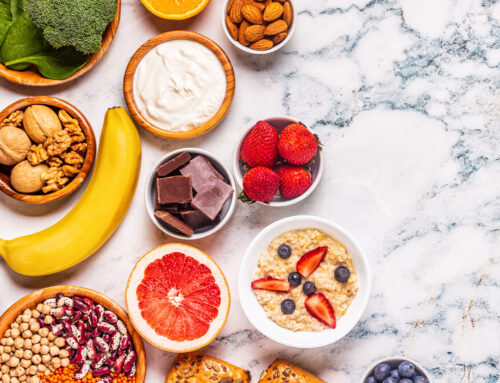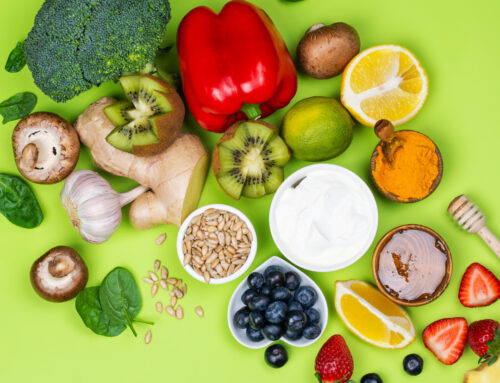“When diet is wrong, medicine is of no use. When diet is correct, medicine is of no need.” – Ayurvedic Proverb
For how true the above statement may be, diet is only part of the story. It is not just what you eat, but how your body absorbs and metabolizes your food. You could be eating healthily, but if your gut is out of balance and inflamed, your cells may be deprived of the nutrients it needs for all the systems of your body to function optimally. A healthy digestive system is fundamental to all aspects of health, and virtually no condition (including mental health) can be addressed without taking a look at the gut. Before rushing to the doctor or drugstore for medicines to alleviate discomfort and don’t address the underlying cause (and may even exacerbate it), try making these lifestyle changes and see if anything changes.
1. EXERCISE to increase blood flow and strengthen muscles that support the digestive system. It takes muscle tone all around the abdomen for food to digest properly. While any form of exercise is beneficial, belly dance uniquely tones the abdominal muscles that help food move through the body and aids digestive health. Another benefit of belly dance is that is draws loving, healing attention to a part of the body many women feel disconnected from. Dance helps us digest our feelings as well as our food! Join me on Patreon for belly dance classes online
2. STIMULATE the vagus nerve through meditative breathing, yoga, foot massage, laughter, gargling, humming singing, and cold water immersion. This will help regulate your nervous system and put your body in “rest and digest” mode. Learn to meditate
3. DON’T OVEREAT, which taxes the digestive system. Eat until three-quarters full to give your body time to process nutrients. It takes 20-30 minutes for your gut to tell your brain you are full. Digestion is a very energy-consuming activity that puts stress on the system. Consider giving your system a break with intermittent fasting if that is appropriate for you, or restrict eating to certain hours of the day. Longevity expert Dr. Mark Hyman suggests allowing 12-16 hours between dinner and breakfast so the body has time to repair. Listen to your body when it comes to this, though. Do what feels healing. And remember, it’s not about counting calories, but making your calories count. Eating nutrient-dense foods will help you feel more satiated.
4. Allowing time for GRATITUDE before eating helps the body prepare for digestion. Taking a moment for a blessing or prayer activates the cephalic (brain) phase of digestion, signaling the release of enzymes that stoke the digestive fires. Breathe in the smell and let your eyes delight in the colors of your food. Feed yourself nourishing thoughts. To support your digestive health in a loving way, check out Louise Hay’s post How You Digest Life.
5. Reduce or ELIMINATE PROCESSED FOODS that rob the body of nutrients. The body has to supply its own energy to process these so-called foods. Rather than contributing value to the body system, processed foods drain the body of precious nutrients. Stick to whole foods and prepare your own food as much as possible. Cooking at home ensures you are eating more healthfully, and having a sensory experience of your food during preparation stimulates the cephalic phase of digestion.
Also, REMOVE INFLAMMATORY FOODS your body cannot tolerate. In addition to limiting sugar intake, gluten and dairy are problematic for many people. Consult with a skilled practitioner to uncover what those foods may be giving you trouble.
6. SLOW down and CHEW your food thoroughly. Saliva contains enzymes that aid digestion, and the more we slow down and chew the more these enzymes are able to break down our food before we swallow it. Gulping down food or eating on the run inhibits this important process and puts unnecessary stress on the system. The more time you spend chewing, the easier it will be for your stomach to continue breaking down your food. By slowing down and breathing intentionally before eating, you also reduce the likelihood of swallowing air which can lead to uncomfortable stomach pains and gas. (Tip: Blow bubbles with your cats to slow down breathing!)
7. Eat more FIBER-rich foods such as legumes which keeps your colon healthy. Adequate fiber intake speeds transit time, diluting the effects of toxins and remove bad bacteria. Soluble fiber absorbs toxins and unneeded cholesterol, and insoluble fiber hastens elimination. Aim for 35 grams/day, and your plate 3/4 full of plant foods. Legumes and cruciferous vegetables can cause stomach distress for some. If you are not accustomed to eating these foods, start low and go slow as your gut adjusts. Also, eat the stock and core of broccoli and cabbage to benefit from the digestive enzyme pepsin. Join the Eat More Plants Challenge to up your fiber intake.
8. BOOST STOMACH ACID by adding freshly squeezed lemon juice or raw fermented apple cider vinegar to your water each morning. Heartburn, gas, belching, fatigue and headaches could all be signs of low stomach acid. Most people, in fact, suffer from too little stomach acid rather than not enough, so taking antacids may be exacerbating the issue. (For a potent immune-boosting elixir with apple cider vinegar, check out this Fire Cider recipe.)
9. DRINK more WATER and eat water-filled fruits and vegetables, such as lettuce, celery, cucumber and tomatoes. Water is necessary for the health of the mucosal lining and small intestine bacteria that support proper digestion and the absorption of nutrients. Too little water in the system can lead to ulcers, indigestion, heartburn, fatigue, brain fog, memory loss, and constipation. To reinforce the importance of staying hydrated, check out the book Your Body’s Many Cries for Water.
10. Incorporate PROBIOTICS into your diet through fermented foods such as sauerkraut, tempeh, miso, kefir, yogurt, kimchi, kombucha, or other fermented and cultured foods. Live microorganisms present in these foods support gut health and are central to our well-being, affecting our mood and many other functions. Prebiotic foods feed those happy gut critters. As fermentation expert Sandor Katz shares, before refrigeration our ancestors relied on fermentation for preservation and their gut bacteria was quite different from ours. A healthy microbiome strengthens the immune system, reduces chronic inflammation, and helps protect against leaky gut.
11. Bring in DIGESTIVE ENZYMES found in live, raw, or sprouted foods. There are three kinds of enzymes needed for the breakdown of foods: lipase for fat, amylase for carbohydrates, and protease for protein. The best source of enzymes are live foods (raw or sprouted) but digestive enzyme supplements are also an option. If you need inspiration I have some great salads on my recipe blog, such as The Ultimate Fall Salad.
12. AVOID EXPOSURE TO TOXINS – Eat organic, purify your water, and eliminate ultra-processed chemical-laden “foods”. Use safe cookware that does not release heavy metals and chemicals. (Contact me if you would like to hear my recommendation.) Avoid toxic people and situations that contribute to unhealthy, unproductive stress. That knot in your stomach is telling you something, and it is inhibiting healthy digestion. Here is a resource if you need support around relationships.
13. COOK AT HOME so you can incorporate many of the above suggestions for optimizing digestion. Make cooking fun, creative, nourishing, and social. Dance in the kitchen. Make your plate beautiful and full of vibrant colors and flavors. Take the time to nourish yourself because you deserve that loving attention. Food is an expression of love, and healthcare begins in the kitchen. Contact me if you would like to join one of my cooking classes, or book a 30-minute kitchen consultation where you can learn tips, tricks, and recipes to make cooking more enjoyable, nutritious, and delicious!





